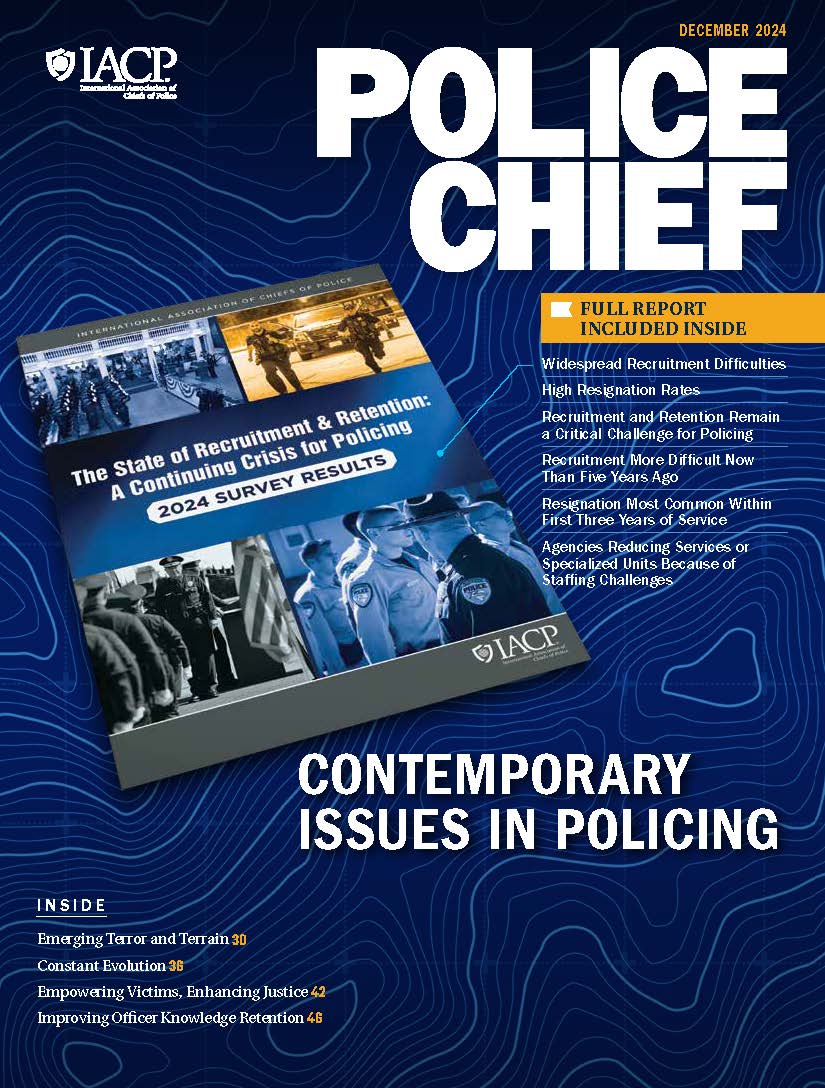
Chief of Police
Thomasville Police Department, Georgia
As law enforcement leaders, we serve communities that encompass populations of diverse backgrounds who have different needs and expectations.
While our very mission is to serve and protect all people equally, how that mission is fulfilled can vary from day to day and for each call to service, depending on a variety of factors. That is why, in order for us to lead our agencies effectively and serve our communities properly, we need to ensure that our officers are trained to interact with all people, in all scenarios, and are able to adapt to diverse needs.
Part of this continual training must be focused on policing vulnerable populations, which include youth; the unhoused; people with developmental or intellectual disabilities; victims of hate crimes, human trafficking, or elder abuse/fraud; and those experiencing addiction, mental health, domestic violence, and many other issues.
We know that criminals continue to abuse vulnerable populations at unacceptable rates and that it is our job to protect these victims. Many of these victims, such as elderly individuals, are often afraid to speak up for fear of additional harm and because their abuser is often a caretaker upon whom they are dependent. Additionally, criminals prey on elderly persons because they are often isolated, making them easier targets for abuse and fraud. Despite efforts to identify and prevent crimes against the elderly, many of these crimes remain unreported.
It is important to note that vulnerable populations don’t just include victims of crimes; these populations can also be perpetrators of crime, making our response sometimes challenging.
“We need to ensure that our officers are trained to interact with all people, in all scenarios.”
Recognizing the need for constant training and effective policies to address solutions for the vulnerable and to ensure we have the resources available to aid the profession as we fulfill our duty to serve and respond to all members of our communities, I would like to highlight a few of the IACP programs and resources that focus on mental health, drug addiction, human trafficking, hate crimes, and alternatives to arrest that can assist law enforcement agencies in better serving our communities.
Crisis Response and Intervention Training
The Crisis Response and Intervention Training (CRIT) is a 40-hour training program designed to prepare our police officers in their response to people experiencing crises related to behavioral health conditions (including mental health conditions and substance use disorders) and intellectual and developmental disabilities. The training program includes 18 modules of varying lengths and learning styles. These modules focus on topical areas such as behavioral health, intellectual and developmental disabilities, community engagement and resources, systems and legal considerations, and scenario-based skills, which aid officers in responding to those experiencing a crisis. Having highly trained officers to handle mental crisis situations will help build trust in our communities.
For more information, visit theIACP.org/projects/academic-training-to-inform-police-responses.
Collaborative Reform Initiative Technical Assistance Center (CRI-TAC)
Through the Collaborative Reform Initiative Technical Assistance Center (CRI-TAC), the IACP offers the Hate Crimes: Recognition and Reporting training. This training is for line-level officers and first-line supervisors and addresses the immediate response on the scene of a potential hate or bias crime. Hate crimes occur when a victim is intentionally selected based on race, religion, national origin, gender, gender identity, sexual orientation, disability, or age. These crimes require special attention because they have a unique impact on both the victim and the community. The training is focused on enhancing law enforcement’s response to hate crimes and uniform patrol officers’ abilities to recognize and report hate crimes. Competencies include addressing victim needs, comprehensively reporting incidents, and building community trust. Education on victims and their needs is integrated throughout the lessons, including victimology research, understanding diverse cultures, communication best practices, interviewing, and social service resources. This training provides law enforcement with the tools we need to serve those who may have experienced a hate crime.
For more information on CRI-TAC, visit theIACP.org/projects/collaborative-reform-initiative-technical-assistance-center-cri-tac.
Anti-Human Trafficking
The IACP’s anti-human trafficking team provides training and technical assistance to support the 50 Office for Victims of Crime–funded Enhanced Collaborative Model human trafficking task forces, foster peer-to-peer learning across task forces, and educate law enforcement and prosecutors on how to establish trust with victims of trafficking and encourage participation with investigative efforts. Groups at higher risk of human trafficking can include racial and ethnic minorities, children, those with disabilities, and other vulnerable groups. The anti-human trafficking team develops and delivers a catalog of specialized training geared toward law enforcement, prosecutors, victim service providers, task force coordinators, and other allied task force members to provide trauma-informed, victim-centered techniques and strategies for addressing human trafficking. By working together, law enforcement agencies can combat human trafficking and protect those who are most vulnerable.
For more information, visit theIACP.org/projects/anti-human-trafficking-training-and-technical-assistance.
IACP Comprehensive Opioid, Stimulant, and Substance Use Program (COSSUP)
The IACP, in partnership with the Center for Health and Justice at Treatment Alternatives for Safe Communities, provides training, technical assistance, and resources to help communities implement evidence-based, systemic solutions at the front end of the justice system to respond to the substance misuse that often underlies justice system involvement. When addicted to drugs, people’s decision-making skills are diminished, which is why many law enforcement agencies are diverting low-risk individuals to treatment rather than arrest them for addiction-related offenses. As police leaders, we should support local, state, and tribal responses to illicit substance use and misuse in order to reduce overdose deaths and promote public safety, and we should support access to treatment and recovery services in the justice system.
To learn more about the IACP COSSUP program, please visit theIACP.org/projects/cossap-law-enforcement-first-responder-partnership-training-and-technical-assistance.
With continued efforts in prioritizing those who are least able to protect themselves and working with community organizations to collaboratively address these issues, I believe law enforcement will continue to build trust with the community. It is my hope that all police leaders will take advantage of these resources to ensure their agencies are better equipped to support our communities’ most vulnerable members. d
Please cite as
John Letteney, “Serving and Protecting All,” President’s Message, Police Chief 90, no. 6 (June 2023): 6–7.


